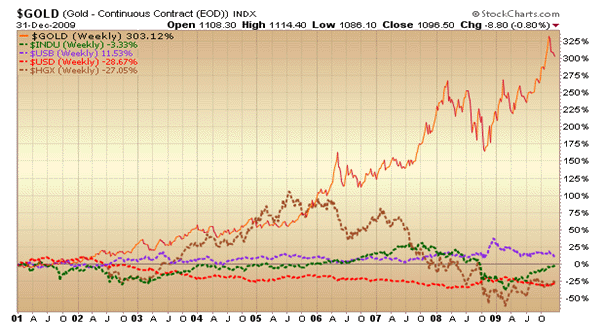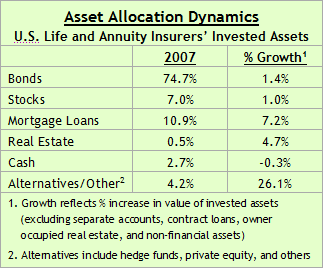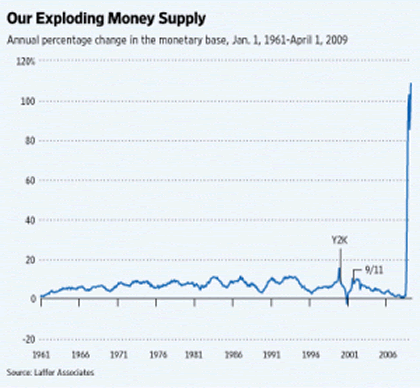Gold, Pension Plans, Insurance Companies & Retirement Programs (IRAs)
Commodities / Gold and Silver 2010 Feb 06, 2010 - 03:25 AM GMTBy: I_M_Vronsky
 The world's three largest depositories of investments are Pension Plans, Retirement Programs (IRAs) and Insurance Companies. Recently the total investment assets of these depositories amounted to approximately $43 Trillion ($43,000,000,000,000):
The world's three largest depositories of investments are Pension Plans, Retirement Programs (IRAs) and Insurance Companies. Recently the total investment assets of these depositories amounted to approximately $43 Trillion ($43,000,000,000,000):
- Pension Plans $25.0 Trillion
- Retirement Plans (IRAs) $10.6 Trillion
- Insurance Companies $7.5 Trillion
In recent years the above investment groups have suffered horrifically grievous losses via their traditional investment vehicles.
Pension Funds Investment Alternatives for its US$25 trillion in assets
Global institutional pension fund assets in the 11 major markets grew by around 9% during 2007 to over US$25 trillion, according to Watson Wyatt's Global Pension Assets Study released, compared to an average growth rate of 12% per annum during the past five years
********Most pension funds invest only in equities and bonds, with small allocations to property and cash********
Let's see what kind of returns (performance) Pension Plans, Insurance Companies & Retirement Programs (IRAs) have received in the last 9 years via the equities (DOW), bonds (T-bonds) and property (real estate) and cash (Certificates of Deposit).
The chart demonstrates the painfully pathetic returns by Pension Funds investments since 2001 (Total Performance shown as of December 31, 2009) - the chart also shows the exhilarating performance of gold during the period):
Gold......................................+303%
Certificates of Deposit....................+27%
US T-Bonds.................................+12%
DOW (equities).............................(-3%)
Housing Index.............................(-27%)
US Dollar.................................(-29%)
Estimated Certificates of Deposit average yearly interest rate about 3.0%, or a total return of a miserly 27% for nine year period. However, when one considers the loss in purchasing power (due to the dollar's 29% decline), CD investments EFFECTIVELY LOST -2% DURING THE 9 YEAR PERIOD. And US T-Bonds suffered a net LOST of -17% during the period.
In years past the average CD interest rate was about 3.0% per annum, but has since plummeted to only 1.8% for a one year CD. Presently, a $10,000 CD is earning a mere $15/month -- but you are suffering a grievous loss in purchasing power as the greenback continues to slide.
Comparative Total Performance In The Last 9 Years:

CLEARLY, the Pension Programs and other investment depositories in the US have failed MISERABLY in their fiduciary responsibility in providing a decent return on investors hard earned savings.
IN THE FUTURE - IMO based upon the recent historical "performance" results, any Pension Plan Director who does NOT allocate a prudent percentage of the Fund's investments to gold, should be fired on the spot for gross incompetence and inexcusable ignorance about viable investment alternatives.
IRAs Are One of the Largest Repository of US Retirement Wealth
Total IRA assets are larger than those accumulated in either private-sector defined benefit (pension) plans or defined contribution (401(k)-type) plans. At year-end 2007, IRAs held $4.75 trillion, private-sector defined contribution (401(k)-type) plans held $3.49 trillion, and private-sector defined benefit plans held $2.33 trillion. IRA growth continues to be fueled by rollovers from other types of retirement plans, not new contributions.
Total assets in IRAs was $10.57 Trillion in 2007
Pension Funds to Buy Gold as Insurance, McGuire Says
October 23, 2009 (Bloomberg) -- Pension funds will increase gold holdings to acquire "financial insurance," pushing prices higher as currencies drop, according to Shayne McGuire, director of global research at the Teacher Retirement System of Texas.
"I think the largest institutions like our own are realizing that we barely own any," McGuire said in an interview in Hong Kong. "The same thing applies to most of the pension funds which manage trillions of dollars in world wealth."
Record government debt and interest rates close to zero percent are pushing gold higher for a ninth straight year as investors seek to protect their wealth against the prospect of rising inflation and currency debasement. Teacher Retirement, backed by $95 billion in assets, has launched its first internally managed gold fund, worth $250 million, invested in precious metals, mining stocks and exchange-traded funds. McGuire is the portfolio manager of this new fund.
The fund is "a reflection of our interest in gold," said McGuire, the author of "Buy Gold Now" published in March 2008 that correctly predicted the metal will rally. "That's mostly because of diversification" that benefits our overall portfolio.
Gold represents only 0.4 percent of total global financial assets valued at around $200 trillion in 2007, McGuire said, adding the future focus for the metal was investment demand.
www.bloomberg.com/apps/news?pid=20601103&sid=aXmYglOn5Sac
LAUNCHES FIRST INTERNALLY MANAGED GOLD FUND
AUSTIN - The Teacher Retirement System of Texas (TRS) announced today that it has launched its first internally managed gold fund with $250 million in assets invested in precious metals mining stocks and exchange-traded funds (ETFs). ETFs are investment vehicles that are traded on stock exchanges and can serve as attractive investments because of their low costs, tax efficiency, and similarity to equities.
www.trs.state.tx.us/about/news_releases/trs_gold_fund.pdf
Even Insurance Companies Are Buying Gold
Northwestern Mutual Makes First Gold Buy in 152 Years
(Bloomberg) -- Northwestern Mutual Life Insurance Co., the third-largest U.S. life insurer by 2008 sales, has bought gold for the first time the company's 152-year history to hedge against further asset declines.
"Gold just seems to make sense; it's a store of value," Chief Executive Officer Edward Zore said in an interview following his comments at a conference hosted by Standard & Poor's in Brooklyn. "In the Depression, gold did very, very well."
Northwestern Mutual has accumulated about $400 million in gold, and Zore said the price could double or even rise fivefold if the economy continues to weaken. Gold gained 10 percent last month, the most since November. The commodity has more than tripled since 2000, rising for eight straight years.
"The downside risk is limited, but the upside is large," Zore said. "We have stocks in our portfolio that lost 95 percent." Gold "is not going down to $90."
Policyholder-owned Northwestern Mutual, based in Milwaukee, ranks third by 2008 life insurance premiums according to data from the National Association of Insurance Commissioners. The data excludes annuities.
www.bloomberg.com/apps/news?pid=email_en&sid=ajf0L9wTPq6Y
Investor Nirav June 15, 2009
According to a recent report from Bloomberg, Northwestern Mutual Life Insurance Co., the third-largest U.S. life insurer, has been buying gold. This is the first time in its 152-year history that Northwestern has purchased gold.
According to Northwestern CEO Edward Zore, "Gold just seems to make sense; it's a store of value. In the Depression, gold did very, very well."
According to Bloomberg, Northwestern has accumulated about $400 million in gold. CEO Zore believes that the price of gold could double "or even rise fivefold" if the economy continues to weaken. "The downside risk is limited, but the upside is large," Zore said. "We have stocks in our portfolio that lost 95%." But gold "is not going down to $90."
http://seekingalpha.com/article/143107-even-insurance-companies-are-buying-gold
Total Size of the U.S. Insurance Market
Total insurance assets in the U.S. at the end of 2007 reached US$6.84 Trillion - 5.0% annual growth

Estimated 2009 total Insurance Company assets was about $7.5 Trillion.

www.in-sure.org/pdf/20/2008%20IAM%20Survey%20-%20Key%20Findings%2010-17-08%20final.doc
Exploding Money Supply fuels roaring inflation
Check out the increase in the money supply over the past year. We all know this will fuel the shiny yellow to unimaginable new record highs in the near future.

http://livingoffdividends.com/2009/06/13/insurance-company-buys-400-million-in-gold/
Pension, Hedge Funds Can Push Gold To $5000
ORONTO (Commodity Online): Gold prices are set to steadily rise in 2010 if pension and hedge fund managers move even 5% of their assets into gold, according to Nick Barisheff, President and CEO of Bullion Management Group.
Speaking at Empire Club in Toronto, Barisheff said gold prices are showing NO sign of slowing as we enter 2010. Several significant events, such as the return of Western central banks as net buyers and the waning of support for the US dollar as the world's reserve currency, will continue to push gold higher.
Barisheff made clear an important fact for investors: "The current pull-back from the recent highs of $1,200 seems to be over, providing an attractive entry point for investors." All signs point to gold continuing its steady rise throughout 2010.
With the financial industry focused on gold, the question is "How high could the price go?" "Many have noticed that fund managers are starting to buy gold as long-term insurance. By one estimate, if the world's pension funds and hedge funds moved just 5% of their assets into gold, it would trade at $5,000," observed Barisheff.
Super-Rich Buy Gold And Sell Hedge Funds
Super-rich buy gold and sell hedge funds By Steve Lodge
The investment preferences of the world's wealthiest families have shifted significantly in favour of gold and other commodities and away from hedge funds in the wake of the financial crisis, according to a survey of family offices and advisers of the super-rich.
Two-thirds of the 100 respondents to a survey by the Family Office Channel, a new website, said that super-rich families are now more likely to invest in gold and other commodities. They are also more interested in bond investments and in holding higher amounts of cash as part of an "instinctive retreat to ultra-safe asset classes".
By contrast, two-thirds of respondents said the wealthiest families are less likely to invest in hedge funds and structured products - investments offering capital protection - with one in three reporting "greatly reduced" interest in these holdings.
Private equity and commercial property are also much less popular asset classes, while attitudes to residential property investment remain largely unchanged.
Size Of The Global Fund Management Industry
Conventional assets under management of the global fund management industry fell 19% in 2008, to $61.6 trillion. Pension assets accounted for $24.0 trillion of the total, with $18.9 trillion invested in mutual funds and $18.7 trillion in insurance funds. Together with alternative assets (sovereign wealth funds, hedge funds, private equity funds and exchange traded funds) and funds of wealthy individuals, assets of the global fund management industry totaled around $90 trillion at the end of 2008, a fall of 17% on the previous year. The decline in 2008 followed five successive years of growth during which assets under management more than doubled. Falls on equity markets, poor investment performance, reduced inflow of new funds, and investor redemptions, all contributed to the fall in assets in 2008. The decline reported in US dollars was also exacerbated by the strengthening of the US dollar during the year.
The US remained by far the biggest source of funds, accounting for over a half of conventional assets under management in 2008 or over $30 trillion. The UK was the second largest centre in the world and by far the largest in Europe with around 9% of the global total.
10 Largest Asset Management Firms
As of July 6, 2009, Bank of America/Merrill Lynch (1.5T) has overtaken UBS (1.4T) as the largest global wealth management firm, with Citi (1.3T) still in sight.
http://en.wikipedia.org/wiki/Investment_management
Gold For Pension Funds
Global pension fund assets rise and fall
GLOBAL, January 30, 2008 - Global institutional pension fund assets in the 11 major markets grew by around 9% during 2007 to over US$25 trillion, according to Watson Wyatt's Global Pension Assets Study released today, compared to an average growth rate of 12% p.a. during the past five years.
Roger Urwin, global head of investment consulting at Watson Wyatt, said: "While assets growth of previous years has been encouraging, events of this month will serve to remind investors of the value of risk management and the benefits of diversification. With average allocation to equities at 56%, global pension fund assets could have diminished by between 1 and 1½ trillion dollars since the beginning of the year."
Since 1997 assets of the largest eleven pension industries have increased from 64% to 82% as a proportion of the Gross Domestic Product (GDP) and during the same period GDP grew by 57%, while global pension fund assets doubled1. Hong Kong has the highest Compound Annual Growth Rate (CAGR) for a ten-year period at around 16% p.a. with Japan, the lowest, at around 3% p.a.
Gold For Pension Funds
With global pension fund assets estimated at $18.6 trillion by the end of 2005, our retirement savings represent one of the world's largest and most significant categories of institutional investment (International Financial Services, London, IFSL, January 2007).
Most pension funds invest only in equities and bonds, with small allocations to property and cash. However, in recent years concerns have grown over the risks inherent in the converging performance of these asset classes, leading to increased interest in assets that could be used to manage this exposure as well as other risks.
The investment community's acceptance of the potential for using alternative assets, including commodities, to spread risk and diversify the portfolios under their stewardship, has also resulted in a renewed interest in the investment characteristics of gold. A growing number of institutions are now looking beyond the precious metal's tactical benefits and considering the implications and possible advantages of a more enduring, strategic allocation.
INTERNATIONAL PENSION FUNDS SUFFER BIG LOSSES
Pension Losses Could Whack 2009 Corporate Profits
"Last year, pension plans of America's 1,500 largest companies lost more than $400 billion, mainly because of the collapse of the equities market in which the bulk of those plans are invested, according to a new report from Mercer, a financial-consulting firm. Pension plans are also being hit on the other side of the balance sheet, as shrinking yields on Treasury bonds expand the scope of their pension fund liabilities. Taken together, the double dose of bad news means companies will have to pony up as much as $70 billion in pension contributions in 2009 - up from $10 billion in 2008 - a development that will surely crimp many companies' earnings"
---------------------
I wager that the pension plans of America's 1,500 largest companies will soon awake to profitable investment aspects of gold during the past nine years.
Because when the pension plans 'discover' gold's monumental price rise, most intelligent and prudent pension plans managers will allocate a fraction of their total assets to gold, or else answer to an army or irate pension owners.
$865 Billion In State Pension Fund Losses
January 14, 2009 by Shepherd Smith & Edwards
$865 billion in state pension fund losses are resulting in reduced benefits for new hires
Because state governments have accrued about $865.1 billion in state pension fund losses, new hires are ending up with reduced benefits. The losses not only exceed the $700 billion Troubled Asset Relief Program that Congress approved last year, but they are accompanied by $42 billion in state budget deficits. In a letter to US Treasury Secretary Henry Paulson, the mayors of Atlanta, Philadelphia, and Phoenix asked for help for their financially beleaguered cities and noted growing pension costs and investment deficits.
---------------------
I am convinced state pension funds will soon 'discover' the profitable investment aspects of gold during the past nine years. Because when the pension plans 'discover' gold's monumental price rise (vis-à-vis their horrific investment losses suffered during the last decade), most intelligent and prudent pension plans managers will allocate a fraction of their total assets to gold, or else answer to an army or irate pension owners.
NY State's Pension Fund Is 26% Poorer
Public-employee pension pool lost a quarter of its value in the past year-the worst 12-month decline in memory. Taxpayers will have to fill big part of the hole starting in 2011.
The New York state employee pension fund shed 26% of its value in the year ended March 31, and taxpayers will need to cough up greater contributions to cover the shortfall.
While the 26% decline in the New York State Common Retirement Fund is better than the broad stock market indices, it translates into a $45 billion decline in the fund's assets. Barring an unprecedented bounce back in equity values, greater contributions from government employers will be needed starting in 2011 to ensure that future obligations to retirees can be met. Those contributions, ultimately, will be paid by taxpayers.
------------------------
Indubitably, the New York State Common Retirement Fund will soon awake to the profitable investment aspects of gold during the past nine years. To be sure, when the pension plans directors 'discover' gold's monumental price rise, most intelligent and prudent pension plans managers will soon allocate a fraction of their total assets to gold, or else answer to an army or irate pension owners.
China Pension Suffers Horrific Loss
China's pension fund had total assets of CNY700 billion at the end of October, ... The financial crisis fueled record losses last year in the nation's pension funds.
Japan Pension Fund Posts $100 Billion Record Loss
- Worst performance since fund began managing own portfolio
- Loss nearly halved in first quarter of this financial year
TOKYO (Reuters) - Japan's public pension fund, the world's largest, said on Wednesday it posted a record loss of almost $100 billion in the last financial year, hit hard by the global financial crisis and a sharp appreciation in the yen.
CONCLUSION
The upshot of the above research is that gold will never reach a Peak Price in any currency…as it has proven to be the ultimate store of wealth, enjoying day-to-day liquidity. Soon the global investment managers of Pension Plans, Insurance Companies & Retirement Programs (IRAs) will be allocating sizable investments to gold, because the yellow metal's total return has far out-performed all other alternative investment vehicles during the past decade. This will forge new record high gold prices on a yearly basis.
 AND THEN THERE'S CHINA !! (The Sovereign Fund of China now has nearly $3,000.000.000.000 - Three Trillion in foreign reserves mostly denominated in US greenbacks).
AND THEN THERE'S CHINA !! (The Sovereign Fund of China now has nearly $3,000.000.000.000 - Three Trillion in foreign reserves mostly denominated in US greenbacks).
In this regard the following is MUST READ:
"CHINA'S PRESSING NEED TO BUY GLD (…there will NEVER be a peak gold price)"
By I. M. VronskyEditor & Partner - Gold-Eagle
www.gold-eagle.com
© 2010 Copyright I. M. Vronsky - All Rights Reserved
Disclaimer: The above is a matter of opinion provided for general information purposes only and is not intended as investment advice. Information and analysis above are derived from sources and utilising methods believed to be reliable, but we cannot accept responsibility for any losses you may incur as a result of this analysis. Individuals should consult with their personal financial advisors.
© 2005-2022 http://www.MarketOracle.co.uk - The Market Oracle is a FREE Daily Financial Markets Analysis & Forecasting online publication.



